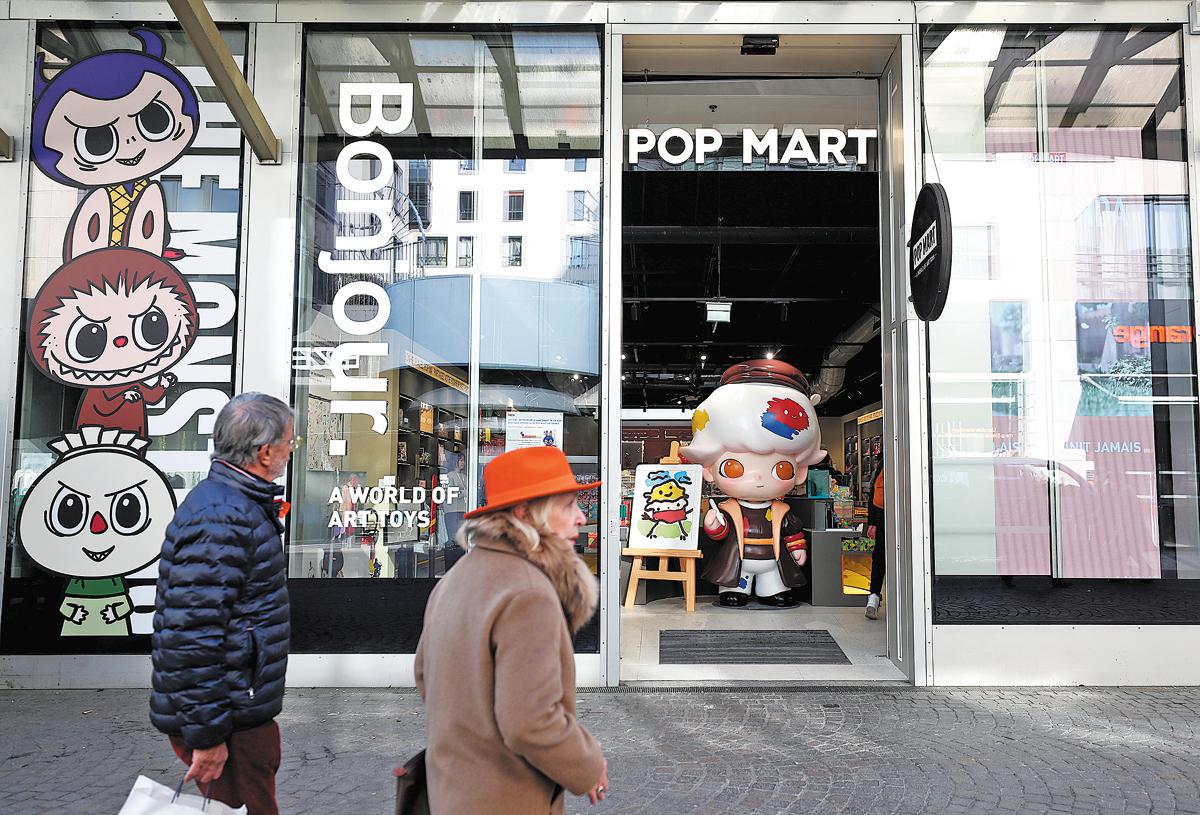Pop Mart looks to expand overseas for growth


Beijing-based pop culture and art toy company Pop Mart is seeking to expand revenue from overseas by opening more stores abroad, especially focusing on Southeast Asia, said its top executive.
On Dec 4, the designer collectibles company opened its second store in the United Kingdom at Westfield Stratford City.
Jarrod Bowen, a professional footballer from the English Premier League club of West Ham United and a member of the English national team, was a guest at the opening ceremony.
Earlier this year, the company set up a second store in New Zealand in Westfield Newmarket Shopping Centre in Auckland.
Designed to captivate young collectors and millennials, Pop Mart released a series of limited-edition figurines, including Skullpanda Dark Maid, Labubu Shepherd, Kubo King of the White Deer, and Pucky the Ghost at the new stores to offer a better shopping experience for customers.
Samson Su, marketing manager of Pop Mart Australia and New Zealand, said, "We keep engaging more with consumers in New Zealand this year. We're expecting more to come soon and better interact with our fans."
Pop Mart, founded in 2010, has in recent years enhanced its reach in more than 25 countries and regions, including South Korea, Japan, Singapore, Australia, the United States, Canada and the UK.
The company had 55 physical stores and 143 Robo Shops in international markets as of June this year. It has grown the fastest in Southeast Asia.
In May, the character-based entertainment company unveiled its first store in Malaysia as part of its Southeast Asian expansion plan.
The store opened in the Pavilion Kuala Lumpur shopping mall with sparkling lights to attract young consumers, following its initial entry into the market through cross-border e-commerce two years ago.
In 2021, the company established its brick-and-mortar store in neighboring Singapore.
Justin Moon, global president of Pop Mart, said Malaysia has enormous potential as the region's second-largest market after Singapore and that the company is looking forward to further developing in other Southeast Asian markets and establishing a comprehensive offline and online sales network, while respecting local culture.
"Malaysia has huge potential as a major market for us after Singapore. Both countries have a similar social culture and offer a relatively large market of art toy collectors. We can leverage what we have done in Singapore to build things up in Malaysia, with the possibility of future expansion into other neighboring countries.
"Our product portfolio, global designers, collaborations with international top intellectual properties, and strong supply chains have laid a solid foundation for our overseas expansions," said Moon.
For example, he added that its wide base of global designers in particular has offered an international artistic and trendy experience for consumers worldwide.
The Southeast Asia market has been growing rapidly, generating healthy turnover, said Moon, thanks to the younger and large-scale art collector population, deep integration within the local culture, and a large number of overseas Chinese, the company said.
Moon also attributed the company's business surge in the Southeast Asian region to the local online and offline marketplace due to the popularity of the internet, mobile devices and online payment systems.
For instance, online shopping platforms including Shopee and Lazada have become the key distribution channels for the growth of Pop Mart products in Southeast Asia.
On running a smooth overseas operation, Moon said it is crucial to make a tailor-made plan and trust a local team, constantly work on communication with local consumers and improve their understanding of the local market.
Gen Z (those born after 1995 and into the 2000s) and white-collar workers between the ages of 15 and 40 are mainstream overseas consumers for the toymaker.
Its leading IPs, including Molly, Skullpanda and Dimoo, have a dedicated set of fans though that can vary by region. For example, Azura is popular in Japan, Pino Jelly in South Korea, and Crybaby sold out instantly in Thailand.
In the third quarter of this year, Pop Mart opened stores in Thailand, the US and Australia. Its first store in Thailand generated sales of more than 2 million yuan ($280,400) on launch day, the highest among its overseas stores globally.
According to its third-quarter financial results released in October, the company posted a more than 35 percent year-on-year increase in revenue, of which operations on the Chinese mainland exceeded 25 percent, while overseas regions rose over 120 percent year-on-year.
Its first-half report showed that Pop Mart posted a revenue of 2.84 billion yuan, up 19.3 percent year-on-year, and a net profit of 477 million yuan.
Its registered members totaled 30.38 million, after adding 4.38 million in the first six months.
The company's top three IPs — Skullpanda, Molly and Dimoo — contributed to 46 percent of its total revenue.
During the release of its first half financial results, the company said it plans to reach a revenue of 1 billion yuan from its overseas business this year, surpassing the overall revenue of the group in 2019.
Capital Securities said Pop Mart's continued penetration of the overseas market is expected to further scale up its business.
In September, Pop Mart opened its first theme park in Beijing to diversify its business categories as it has vowed to become the Chinese answer to Disney.
The park, named Pop Land, displays its top IP characters, including Molly, Labubu, Dimoo, Skullpanda and Pucky, retail shops, catering and interactive plays, in collaboration with the Chaoyang Culture and Tourism Group.




































